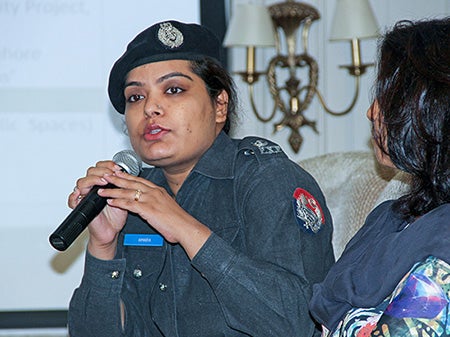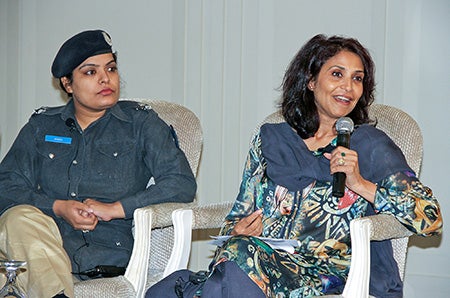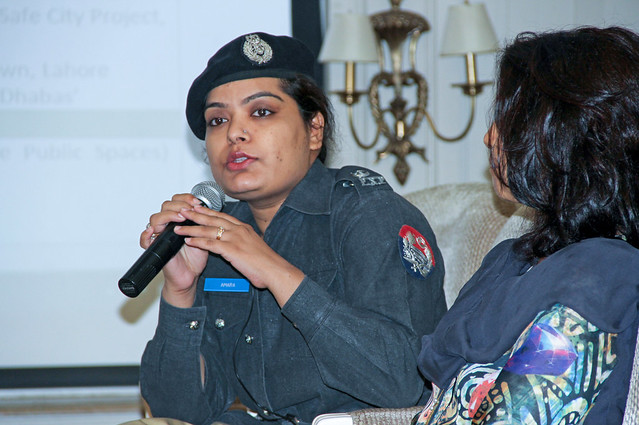Claiming Our Spaces: Enhancing Women and Girls’ Safety and Mobility in Public Spaces
Date:
[Press Release]
Lahore, Pakistan – In designing and planning safe cities and safe public spaces to enhance women and girls’ safety and mobility in public spaces, the Government of Punjab’s Chief Minister’s Special Monitoring Unit (Law and Order Wing), the Punjab Commission on the Status of Women and Punjab’s Women Development Department in collaboration with UN Women (the United Nations Entity for Gender Equality and the Empowerment of Women) brought together a number of national and international experts who have designed and implemented “Safe City and Safe Public Spaces Programmes” in similar socio, economic and cultural contexts.
![[IMAGE]](/sites/default/files/Field%20Office%20ESEAsia/Images/2016/09/29351080153_8bc9040c0f_k-675px.jpg?la=en)
The event held on Tuesday 27 September 2016 in a local hotel in Lahore, addressed issues, challenges and responses to prevent and respond to sexual violence against women in public spaces as part of UN Women’s Safe Cities and Safe Public Spaces Global Flagship Initiative.
Bushra Aman (Secretary, Punjab’s Women Development Department) welcomed guests to the first joint dialogue on peaceful cohabitation and non-discrimination of women and looked forward to a deepened understanding of how the use of and access to public spaces relates to and enhances women’s rights, equality and participation.
![[IMAGE]](/sites/default/files/Field%20Office%20ESEAsia/Images/2016/09/29943695796_9ca6747c0e_k-450px.jpg?la=en)
Jamshed Kazi (Country Representative, UN Women Pakistan) in his opening remarks highlighted emerging key promises of UN Women’s global safe city programme initiated five years ago as: the inclusion of a rights based approach of safe cities and urbanization; the inclusion of women and girls in the research and planning process; and to ensure diverse programming to make sure no-one is left behind.
Khawar Mumtaz (former Chairperson, National Commission on the Status of Women) in highlighting challenges in urbanization taking place in Pakistan at a fast pace, said: “In search of better opportunities a pattern occurs where men move first with women following later. With population pressure increases in urban areas, the ground realities are that cites are faced with congestion, not enough space, health issues, informal settlements, increase in poverty, water and sanitation crises and we find there is not enough food or security.”

A panel discussion on urban and social development as part of a comprehensive approach to reduce violence against women and girls in major cities, focused on issues, policies, and efforts undertaken to deal with problems, and opportunities, arising from the acceleration of urbanization and security of public spaces for both women and men. The discussions further strengthened commitments from a gender perspective as part of a comprehensive approach to reduce violence against women and girls. Panelists included Akbar Nasir Khan (Chief Operating Officer, Lahore’s Safe City Project), Fauzia Viqar (Chairperson, Punjab Commission on the Status of Women), Rida Shahzad (Chief Minister’s Special Monitoring Unit) and Amara Athar (Superintendent Police Investigation, Lahore).

In effectively adapting and piloting UN Women’s global Safe City model in Pakistan, presentations and tools were shared by international experts: “Global Perspective and Best Practices On Safe Cities/Safe Urban Spaces Initiatives” by Laura Capobianco (Policy Specialist, Safe Public Spaces, UN Women HQ); “Policy Legislation and Legal Work” by Cherine Aly (Project Associate, Ending Violence Against Women, UN Women Egypt); “Safety Audit: Scoping Study and Saftipin - Lessons Learnt from India & Asia-Pacific” by Kalpana Viswanath (Co-founder and Director, Safetipin, India); and “Essential Services Package of Modules” by Caroline Ann Meenagh (Policy Specialist (Multi-Sectoral Services for Ending Violence Against Women), UN Women HQ).
The event concluded with designing and endorsing a step-by-step approach on key areas (policy, advocacy and behavioral change) to ‘facilitate’ women and girls to exercise their rights: to move around freely; to use and access public spaces and services; to make choices about their place of residence, work, or leisure; and more broadly, to make the best of the opportunities a city has to offer.
Participants included representatives from government departments, civil society, academia and research institutions, judiciary, security sector, human rights activists, UN agencies and media partners.
The consultation was carried out under UN Women in Pakistan’s ‘Ending Violence Against Women and Girls’ programme, with support from the Government of Australia to increase participation of women in society as leaders and change makers based upon: (i) access to safe public spaces; (ii) successful remedies against violence against women; and (iii) awareness about rights and services to promote empowerment of women.
Photo Gallery
For more information:
Please contact: Faria Salman
Strategic Management and Partnerships Officer &
Communications Focal Point for UN Women Pakistan
Email: [ Click to reveal ]
